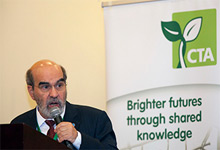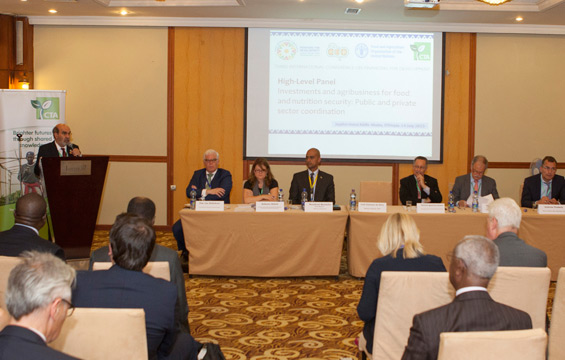ACP, FAO, CTA make a joint call in Addis Ababa
 Addis Ababa, 15 July 2015/ ACP: A high-level panel on Investments and Agribusiness for Food and Nutrition Security: Public and Private Sector Coordination took place in the margin of the Third International Conference on Financing for Development (13-16 July 2015).
Addis Ababa, 15 July 2015/ ACP: A high-level panel on Investments and Agribusiness for Food and Nutrition Security: Public and Private Sector Coordination took place in the margin of the Third International Conference on Financing for Development (13-16 July 2015).
The high-level panel, jointly organised by the Africa-Caribbean-Pacific (ACP) Group, FAO and CTA brought together high-level speakers to discuss how to better coordinate investments by the private and public sectors in the agri-food sector to achieve sustainable food and nutrition security, and the specific nature of these investments. The meeting was opened by Patrick Ignatius Gomes, Secretary-General of the ACP Group of States, José Graziano da Silva, Director-General of FAO and Michael Hailu, Director of CTA, who also moderated the discussions.
Panellists included Wondirad Mandefro, State Minister of agriculture; a representative of Roberto Ridolfi, Director, Sustainable Growth and Development/Director General Europaid, European Commission; Pim van Ballekom, Vice President, European Investment Bank; Pierre van Hedel, Managing Director, Rabobank Foundation and Andreas Proksch, Director-General, Africa Department, GIZ.
The event aimed at highlighting the importance of coordinated public and private sector investments in food value chains and food systems to achieve Sustainable Development Goal 2 on ‘ending hunger, achieving food security and improved nutrition and promoting sustainable agriculture’ and Goal 8 on ‘inclusive and sustainable economic growth, full and productive employment and decent work for all.’
Such investments are vital as shown in the new FAO, IFAD and WFP report on Achieving Zero Hunger: The critical role of investments in social protection and agriculture. Eradicating world hunger sustainably by 2030 will indeed require an estimated additional $267 billion per year on average for investments in rural and urban areas and in social protection, so poor people have access to food and can improve their livelihoods. This would average $160 annually for each person living in extreme poverty over the 15 year period.
“We are here to share good practices and identify priority areas for coordinated public-private investments in food value chain and food system development, with beneficial returns for small and medium-sized agro-enterprises, in the agri-food sector and the overall economy, including in policies, knowledge and technology and capacity development as encouraged in the more recent FAO Private Sector Strategy”, pointed out Graziano da Silva in his opening remarks. “Examples of success exist and demonstrate how coordinating private-sector and public-sector investments can lead the way towards the economic transformation in the developing world”, he added.
On his part, Patrick Ignatius Gomes, Secretary-General of the ACP Group of States, stated that resolving the challenges of achieving universal food and nutrition security in a sustainable manner requires significant and well-coordinated investments by the public sector, the private sector and civil society.
“This is reflected in the ACP Private Sector Development Strategy. We will support further initiatives that highlight the critical importance of mobilizing domestic and international financial resources, leveraging international trade, and increasing international development cooperation to achieve sustainable development goals. To achieve this, partnerships are key”, declared Gomes.
Concrete steps and commitments
“The specific nature of both public and private sector investment in food system development and how to better coordinate them to achieve sustainable food and nutrition security, still represent many unanswered questions which the panel sought to answer”, commented CTA Director, Michael Hailu.
Key recommendations emerged from the high-level panel. They range from policy support at country level; the operationalization of the policy framework for enhanced, structured engagement of aid programs with the private sector; the need to leverage private finance in development and what mechanisms are in place to support small and medium-sized enterprises in the agrifood sector and the need to support inclusive and profitable value chains.
The Ethiopian capital hosts The Third International Conference on Financing for Development (13-16 July 2015) attended by high-level political representatives, including Heads of State and Government, and Ministers of Finance, Foreign Affairs and Development Cooperation, as well as all relevant institutional stakeholders, non-governmental organizations and business sector entities.
The Conference will result in an inter-governmentally negotiated and agreed outcome, which should constitute an important contribution to and support the implementation of the post-2015 development agenda.

Related Information
Contacts:
Liliane.Kambirigi@fao.org ; gambier@cta.int
